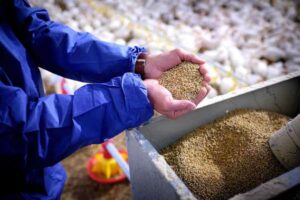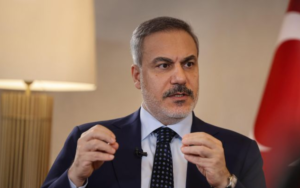
Khorol Mechanical Plant (Ukraine) has begun the process of localizing production in Turkey, according to the information and analytical agency APK-Inform, citing information from Valentin Surmach, director of the technical department at KMP.
“Taking into account the successful experience of joint implementation of complex projects, Izvik Makina Muhendislik Ic Ve Dis Ticaret Limited Sirketi has been selected as the main partner in the localization process,” he said at the AgroFood Summit-2025 international conference (Mersin, Turkey).
According to him, the localization stages include large-scale assembly, equipping products with electric motors and gear motors from Turkish manufacturers, and the phased organization of the production of components and parts in Turkey, including on the basis of outsourcing (by mutual agreement).
The plant confirms the warranty for equipment manufactured in the localization process, as well as the technical parameters of the technological lines based on the plant’s equipment, which Izvik Makina offers to its customers.
Khorol Mechanical Plant is a Ukrainian enterprise specializing in the manufacture of equipment for grain storage and cleaning; production of mixed fodder, cereals, flour, oil, seed material; aspiration systems; mechanical grain transportation; production of fuel pellets, briquettes, etc.

Peace talks between Russia and Ukraine may resume in Turkey, Turkish Foreign Minister Hakan Fidan said in an interview with broadcaster A Haber.
“Well, of course, we cannot go into details for reasons that you will understand, I mean, I think it (the talks – IF-U) could happen in Turkey, it could happen in other places. But this peace not only must happen, it will happen,” the minister said.
Fidan stressed that the war is now at its “darkest moment” and that both sides, according to him, are focused on destroying each other’s infrastructure. He noted that the use of drones and “kamikaze” drones makes it difficult to move around and conduct operations, and that the successes of the Ukrainian and Russian forces come at a high human cost.

According to the Turkish Statistical Institute (TÜİK), in September 2025, sales of real estate to foreigners in Turkey fell by 7.7% year-on-year to 1,867 properties. The share of transactions with foreigners in the total volume was 1.2%. Most purchases were made in Istanbul (744), followed by Antalya (557) and Mersin (124).
Among foreign buyers, Russians took first place with 267 properties, followed by Iranians with 202 and Iraqis with 146. The top five also included citizens of Germany with 121 and Ukraine with 118. In January-September, foreigners purchased 14,944 properties, which is 12.6% less than a year earlier.
A total of 150,657 residential units were sold on the Turkish market in September, which is 6.9% more than in September 2024.

According to the results of January-October 2025, Poland, Turkey, and Germany remain Ukraine’s largest export destinations. The volume of supplies to Poland amounted to $4.2 billion, to Turkey – $2.2 billion, to Germany – $2.0 billion, according to the State Customs Service.
Food products lead the export structure with $18.2 billion, metals and metal products with $3.9 billion, and machinery, equipment, and transport with $3.1 billion. UAH 950.7 million was paid to the budget for the clearance of goods subject to export duties.
According to the State Customs Service, total exports for 10 months decreased by 4.05% to $33.2 billion.
After a nighttime incident in Podgorica, where a group of Turkish citizens stabbed a local resident during a conflict, the government of Milojko Spajić announced a temporary suspension of the visa-free regime for Turkish citizens—a political signal that security and entry controls take priority over previous openness (visa-free travel had been in place since 2008). The decision was confirmed by leading international media and government sources, which record both the incident itself and the authorities’ response formula—“a temporary pause + a rules review,” with the prospect of further consultations with Ankara on a new visa regime.
According to police reports, after a weekend marked by tension in the capital, several dozen foreigners—primarily citizens of Türkiye and Azerbaijan—were detained; President Jakov Milatović publicly called for calm and condemned retaliatory attacks on Turkish citizens and their property. This set of actions—stepped-up patrols, selective checks of legal stay, and preventive detentions—aligns with the logic of a “rapid stabilization” of order following stabbing incidents.
The socio-political backdrop has sharpened: anti-Turkish slogans were heard on the streets of Podgorica, and acts of vandalism were recorded—in particular, a business owned by a Turkish citizen in the city center was trashed, and a Turkish owner’s car was set on fire. These episodes heighten the risk of “collective responsibility,” when a single criminal offense triggers a chain of xenophobic reactions that harm people’s safety and the business climate.
The interstate dimension is developing in parallel: Türkiye’s foreign ministry promptly reached out to the Montenegrin prime minister and security officials, insisting on guarantees of rights and protection for Turkish citizens; Podgorica, for its part, declares “intensive consultations” with Ankara to find a model that combines public safety with continued economic interaction. This means that the “pause” in visa-free travel is not only a punitive gesture but also an instrument for reformatting access rules: new forms of short-term visas, mandatory registration procedures, or higher criteria for business visitors are possible.
The economic projection of the situation is ambiguous. Turkish business in Montenegro is a notable player in trade, hospitality, and real estate, especially along the Adriatic coast; rolling back visa-free travel will almost certainly reduce the mobility of entrepreneurs and workers, complicate seasonal planning, and slow transactional processes. Estimates of the size of the Turkish community vary: a number of sources cite roughly 13.3 thousand officially resident Turkish citizens (which is higher than the 2–3 thousand estimates mentioned in some materials), and for this group a clear, predictable procedure for extending stays and conducting business is crucial to avoid an outflow of investment and a “cooling” of employment in tourism and services.
At the domestic political level, the authorities’ decision serves several functions at once: it demonstrates control and sensitivity to the demand for security; cuts off the argument about “open gates” for offenders; and simultaneously mitigates reputational risks vis-à-vis the EU, with which Montenegro is negotiating membership, by aligning migration regimes and public-order standards with European practice. However, excessive “toughness” without simultaneously restraining xenophobia may provoke an escalation of ethnic tension and inflict long-term damage on the country’s investment image—this is precisely why the president’s message about the inadmissibility of attacks on Turks is a systemically important marker of balance.
From this follow the near-term scenarios. The first is “controlled thawing”: after stabilization and de-escalation of violence, and after technical parameters are agreed with Ankara, Podgorica restores simplified entry in an updated format (for example, through mandatory declarations of travel purpose or expedited category-based visas for investors and workers). The second is a “long pause”: the visa regime becomes entrenched, criteria for verifying the very purpose of entry and the legality of stay grow stricter, and Turkish companies’ business processes become costlier and slower, with a risk of investment being reallocated to neighboring jurisdictions. The third is “social turbulence”: if law-enforcement response to anti-Turkish pogroms is unsystematic, public sentiment will radicalize, and even a properly calibrated visa filter will not compensate for the loss of investor and tourist confidence. At present, government communications—about consultations with Türkiye and safeguarding public order—indicate that the bet is on the first, compromise path.
In summary, Montenegro’s decision to suspend visa-free travel is a system-level “alarm signal”: the authorities are simultaneously extinguishing a situational security crisis and trying to revise the architecture of migration procedures according to standards of control and predictability. However, the sustainability of this course will be determined not only by the strictness of border filters, but also by the state’s ability to protect lawful residents and entrepreneurs from collective punishment, hold perpetrators accountable, and preserve channels of economic cooperation with Türkiye—a partner that is already demanding security guarantees for its citizens and is ready to negotiate new rules of the game.
CRIME, INVESTMENTS, MONTENEGRO, PODGORICA, PUBLIC SENTIMENT, TURKEY